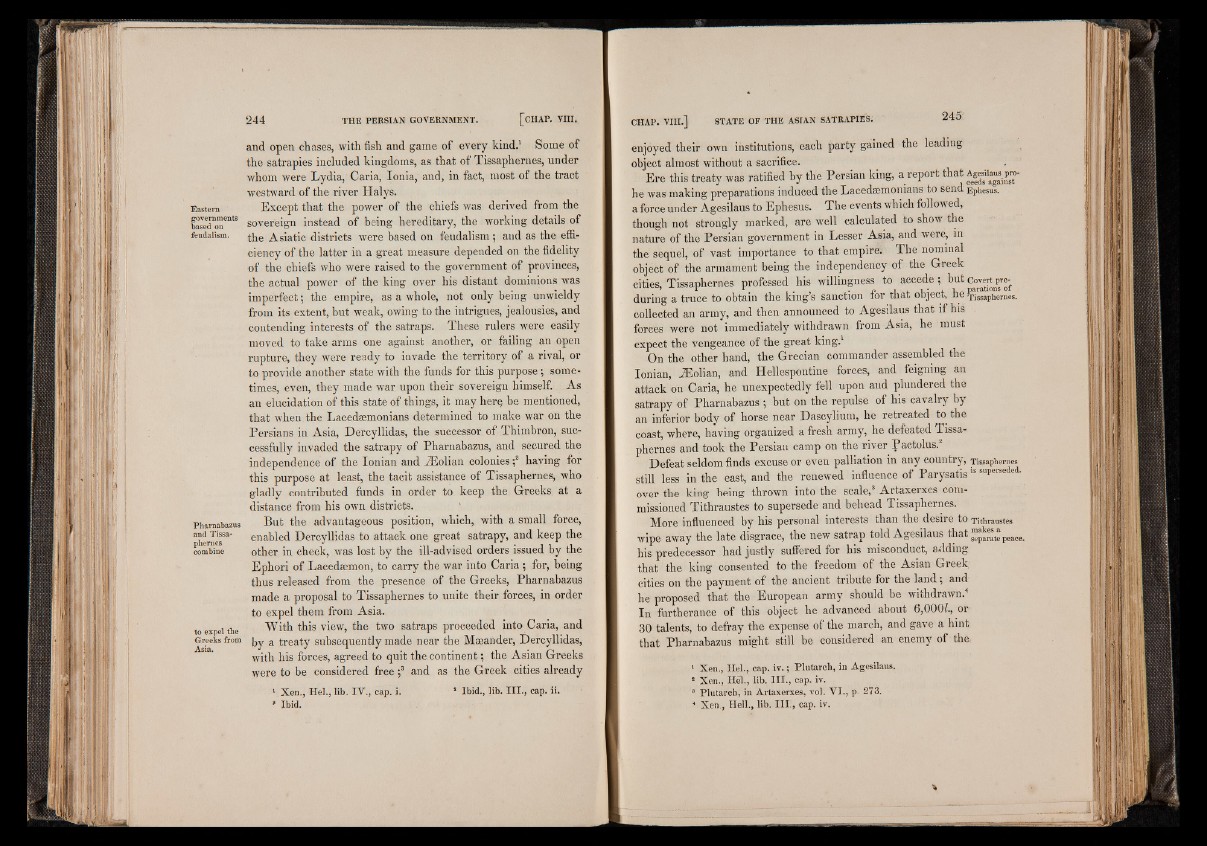
Eastern
governments
based on
feudalism.
Pharnabazus
and Tissa-
phernes
combine
to expel the
Greeks from
Asia.
and open chases, with fish and game of every kind.1 Some of
the satrapies included kingdoms, as that of Tissaphernes, under
whom were Lydia, Caria, Ionia, and, in fact, most of the tract
westward of the river Halys.
Except that the power of the chiefs was derived from the
sovereign instead of being hereditary, the working details of
the Asiatic districts were based on feudalism; and as the efficiency
of the latter in a great measure depended on the fidelity
of the chiefs who were raised to the government of provinces*
the actual power of the king over his distant dominions was
imperfect; the empire, as a whole, not only being unwieldy
from its extent, but weak, owing to the intrigues, jealousies, and
contending interests of the satraps. These rulers were easily
moved to take arms one against another, or failing an open
rupture, they were ready to invade the territory of a rival, or
to provide another state with the funds for this purpose; sometimes,
even, they made war upon their sovereign himself. As
an elucidation of this state of things, it may here; be mentioned,
that when the Lacedaemonians determined to make war on the
Persians in Asia, Dercyllidas, the successor of Thimbron, successfully
invaded the satrapy of Pharnabazus, and secured the
independence of the Ionian and .¿Eolian colonies ;2 having for
this purpose at least, the tacit assistance of Tissaphernes, who
gladly contributed funds in order to keep the Greeks at a
distance from his own districts.
But the advantageous position, which, with a small force,
enabled Dercyllidas to attack one great satrapy, and keep the
other in check, was lost by the ill-advised orders issued by the
Ephori of Lacedaemon, to carry the war into Caria ; for, being
thus released from the presence of the Greeks, Pharnabazus
made a proposal to Tissaphernes to unite their forces, in order
to expel them from Asia.
With this view, the two satraps proceeded into Caria, and
by a treaty subsequently made near the Maeander, Dercyllidas,
with his forces, agreed to quit the. continent; the Asian Greeks
were to be considered free ;3 and as the Greek cities already
1 Xen., Hel., lib. IV ., cap. i. ■ Ibid., lib. I I I . , cap. ii.
s Ibid.
enjoyed their own institutions, each party gained the leading
object almost without a sacrifice.
Ere this treaty was ratified by the Persian king, a report that Agesiiaus.pro-
he was making preparations induced the Lacedaemonians to sen Ephesus,
a force under Agesilaus to Ephesus. The events which followed,
though not strongly marked, are well calculated to show the
nature of the Persian government in Lesser Asia, and were, in
the sequel, of vast importance to that empire. The nominal
object of the armament being the independency of the Greek
cities, Tissaphernes professed his willingness to accede; but covert Pre-
• _ # . n 1 4- * 4- Tv o p 2 .v 3 X io n s 0 1 during a truce to obtain the kings sanction tor tnat oDjeci, ne TisgaplierneSi
collected an army, and then announced to Agesilaus that if his
forces were not immediately withdrawn from Asia, he must
expect the vengeance of the great king.1
On the other hand, the Grecian commander assembled the
Ionian, vEolian, and Hellespontine forces, and feigning an
attack on Caria, he unexpectedly fell upon and plundered the
satrapy of Pharnabazus ; but on the repulse of his cavalry by
an inferior body of horse near Dascylium, he retreated to the
coast, where, having organized a fresh army, he defeated Tissaphernes
and took the Persian camp on the river Pactolus.2
Defeat seldom finds excuse or even palliation in any country, Tissaphernes
still less in the east, and the renewed influence of Parysatis15 superEeded-
over the king being thrown into the scale,3 Artaxerxes commissioned
Tithraustes to supersede and behead Tissaphernes.
More influenced by his personal interests than the desire to Tithraustes
wipe away the late disgrace, the new satrap told Agesilaus that ™ ^ peace_
his predecessor had justly suffered for his misconduct, adding
that the king consented to the freedom of the Asian Greek,
cities on the payment of the ancient tribute for the land; and
he proposed that the European army should be withdrawn."
In furtherance of this object he advanced about 6,000/., or
30 talents, to defray the expense of the march, and gave a hint
that Pharnabazus might still be considered an enemy of the
1 Xen., Hel., cap. iv .; Plutarch, in Agesilaus.
* Xen., Hel., lib. I I I ., cap. iv.
3 Plutarch, in Artaxerxes, vol. V I., p. 273.
4 Xen., Hell., lib. I I P , cap. iv.